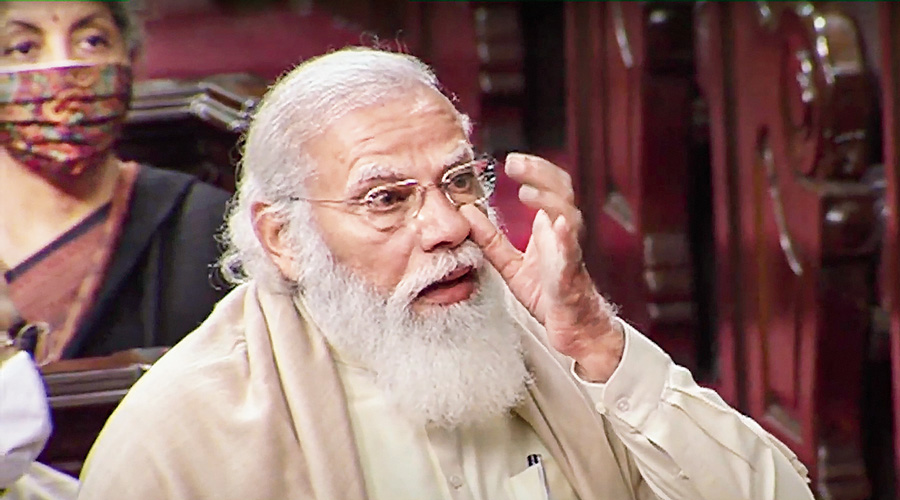Whatever your views on Prime Minister Narendra Modi, you’ve got to credit his government for the consistency and predictability of its response when faced with a political crisis. Whether it’s criticism of its human rights record or a global investigation revealing the use of Israeli spyware against those it views as opponents, you know Modi’s team will argue it’s a conspiracy to defame the prime minister and — since Modi to them is synonymous with India — the country.
It’s a strategy that works when most people don’t know better. But like the boy who cried wolf, there’s only so many times it works before even those who want to believe you start wondering if they’re being played. And for the Modi government, the problem is particularly serious: a prime minister who has long craved global validation now finds himself exposed before the world, thanks to back-to-back crises that have resonated internationally.
Over the past few days, an international collaboration of media organizations has uncovered extensive spying and hacking of phones across dozens of countries using the spyware named Pegasus. Globally, the targets for spying and hacking identified by the Pegasus Project include the French president, Emmanuel Macron, Morocco’s king, Mohammed VI, the South African president, Cyril Ramaphosa, the former Mexican president, Felipe Calderón, Emirati princesses, judges, journalists and more. In India, the list ranges from the Congress leader, Rahul Gandhi — who changes his device frequently but still couldn’t evade the Pegasus spyware — and a set of journalists and activists to even a Supreme Court employee who had accused a former Chief Justice of India of sexual harassment.
The response from the government and the ruling Bharatiya Janata Party has been unsurprising — even if contradictory at times. The junior foreign minister, Meenakshi Lekhi, called the reports on spying “fake”, claiming that Amnesty International, which procured the list of Pegasus targets, has denied the existence of such a catalogue of names (it has, in fact, said that it stands by the investigation). Assam’s chief minister, Himanta Biswa Sarma, also from the BJP, has asked the Central government to act against Amnesty for trying to taint Modi’s image. Not to be left behind, the home minister, Amit Shah, has blamed the revelations on “disruptors” that he describes as “global organizations which do not like India to progress”. And the former information and technology minister, Ravi Shankar Prasad, has insinuated a conspiracy by falsely claiming that India was being selectively questioned from among the dozens of countries believed to have used Pegasus.
Yet, the government has refused to clearly deny that it has purchased Pegasus. Independent forensics analysis on several of the phones in the target list, including those of several journalists, has shown that they were indeed infected by the spyware. NSO, the Israeli group that owns Pegasus, insists that it only licenses the product to governments. So if the Indian government isn’t the one hacking — and potentially manipulating content on — the phones of political opponents, journalists, activists and others, is a foreign power behind the use of the spyware? And if that’s the case, why isn’t the Modi government, which, otherwise, likes to tom-tom its national security credentials, at all alarmed?
It’s hardly the first time that the Modi government has been caught with its hand in the cookie jar. And whether it’s the overnight revocation of Kashmir’s autonomy, the ill-advised step of demonetization or the government’s systematic erosion of India’s democratic institutions, much has been written in the international press in the past that’s critical of Team Modi. But the global scale of the Pegasus hacking makes the Modi administration’s assault on Indian democracy a part of a wider international story that people around the world can relate to.
And these revelations come close after the government’s monumental failures in preparing for the second wave of Covid-19 that made India the headline story the world over for the wrong reasons. Unlike Kashmir and demonetization, the pandemic is a shared experience for people across the planet. So when they see images of unclaimed bodies floating down the Ganga, it hits home — everywhere.
To be sure, other governments — whether in the United States of America or Europe — aren’t genuinely concerned about civil liberties. As long as they see India as a valuable strategic partner, especially in countering China, they would like to ignore the wounds Modi is inflicting on this country. But in mature democracies, ruling dispensations must at least appear to heed the views of their people. If most ordinary Americans and Europeans start pushing back against a business-as-usual relationship with the Modi government, just as they have when it comes to ties with another strategically vital ally, Saudi Arabia, it becomes hard for elected leaders in Washington, Brussels and elsewhere to ignore those concerns.
Put simply, Modi’s global reputation is today at its lowest ebb since he came to power in 2014. And crying wolf once again won’t fix it.










